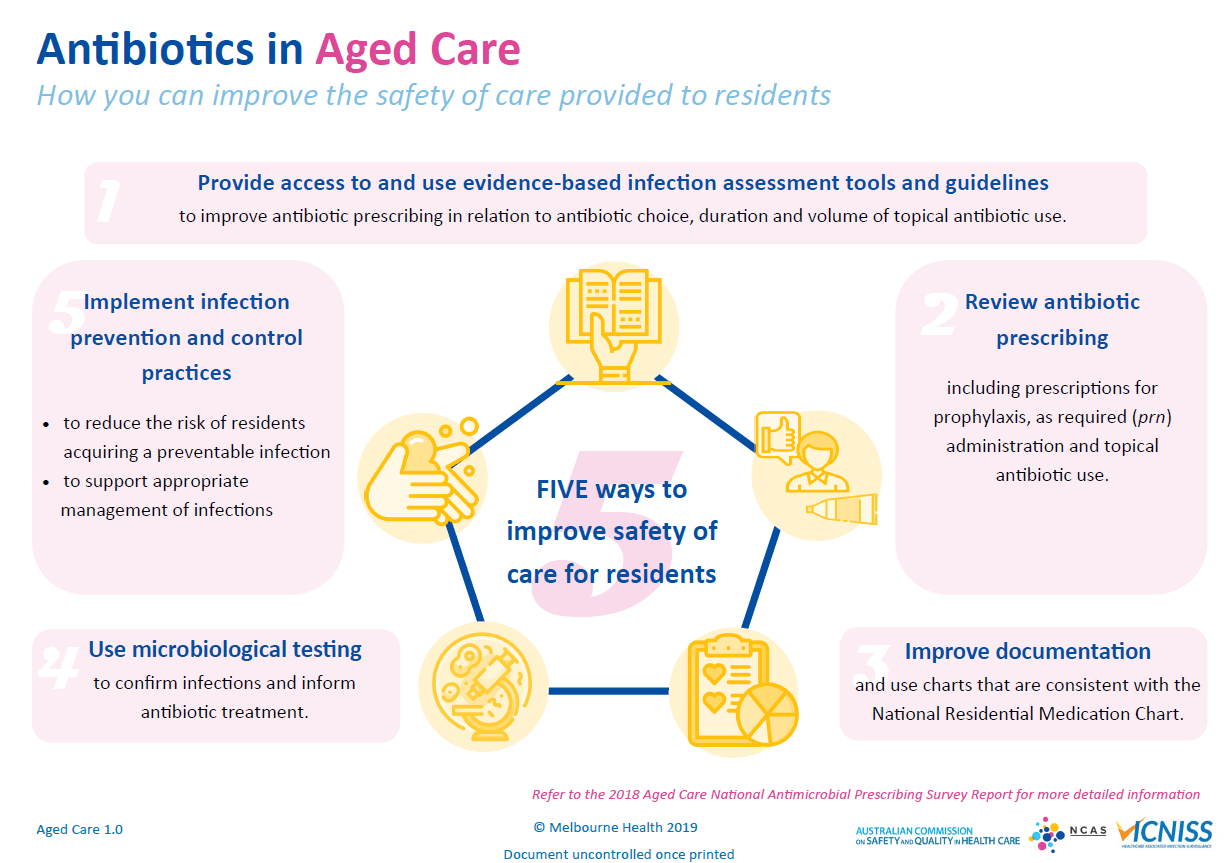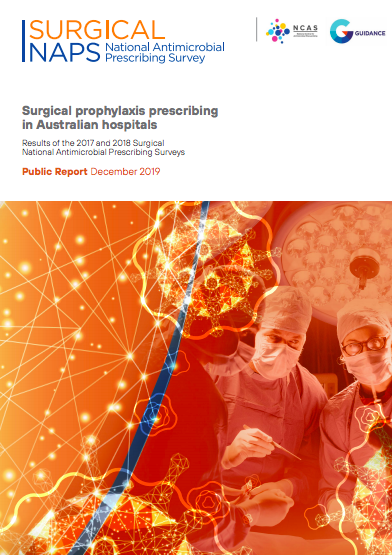Aged Care
Resources to assist with meeting the Aged Care Quality Standards
Aged care home stream
Recent studies have shown a significant burden of infection and colonisation with antibiotic-resistant bacteria among aged care home (ACH) residents as well as frequent inappropriate receipt of antibiotics. The VICNISS Coordintating Centre has well-established linkages and gives longstanding support to small rural hospitals that include such facilities. They have investigated surveillance methods in these settings, and described higher than international infection rates and antimicrobial use in Victorian facilities.
The researchers in this stream will investigate the optimal way of collecting antimicrobial consumption, infection and susceptibility data in ACHs, and opportunities for enhancing antimicrobial use in ACHs. The Aged Care National Antimicrobial Prescribing Survey (AC NAPS), delivered by NCAS and VICNISS, has been implemented nationally in Australia in these settings since 2015. The findings of the AC NAPS will be used to identify optimal interventions to improve antimicrobial stewardship in ACHs, with further input from key stakeholders.
Ultimately, this research stream will identify the optimal approach to measuring antimicrobial consumption in aged care facilities, assessing the use of the AC NAPS in the ACH setting to gather data on antimicrobial use and to support AMS, and identify and test interventions to optimise antimicrobial prescribing in ACHs.
The aims of our research on antimicrobial use and AMS in ACHs are to:
- Understand antimicrobial use and AMS in ACHs in Australia;
- Describe antibiotic prescribing for urinary tract infections in Australian ACHs: examine prescribing practices and concordance with national guidelines;
- Describe diagnosis of respiratory tract infections in ACHs;
- Optimise treatment of RTIs in ACHs: nurse-initiated PCR testing;
- Analyse antibiotic use for RTIs in ACHs;
- Examine the potential for optimisation of antibiotic use near the end of life in ACHs: examine nurses’ opportunities to lead AMS; and
- Develop AMS interventions for antibiotic use near the end of life in ACHs.
Our collaborative application for an MRFF aged care research grant was successful in 2021. Our integrated project will engage three leading multidisciplinary groups currently working to improve quality of care in the Australian aged care sector: the Victorian Healthcare-Associated Infection Surveillance System (VICNISS), the National Centre for Antimicrobial Stewardship (NCAS) and the Registry of Senior Australians (ROSA). The timely aim is to develop, implement and scale a surveillance program to reduce the incidence of infectious diseases in Australian aged care homes (ACHs) - the National Infection Surveillance Program for Aged Care (NISPAC). The program will address known barriers to effective infection prevention and control (IPC) practices, improve quality of care for consumers and support policy and accreditation standards at the facility-level. NISPAC will provide a dedicated and secure portal accessible by ACH staff to enable participation in a national infection surveillance program that includes quality indicators, benchmark reporting and IPC support resources. Over the next three years, we will keep you informed about the progress of this project.

Improving management of urinary tract infections in residential aged care facilities Lyn-Li Lim, Noleen Bennett Abstract Antimicrobial resistance rates are higher in Australian residential aged care facilities (RACFs) than other community or hospital settings. This is driven by antibiotic overuse and misuse. Urinary tract infection (UTI) is consistently the most common infection treated with antibiotics in Australian RACFs. The aim of this article is to provide an overview of how general practitioners (GPs) can support appropriate UTI management in RACFs following antimicrobial stewardship (AMS) principles. GPs are well placed to improve UTI management in RACFs. In this article, criteria for suspected, proven, recurrent and relapsed UTI are outlined, in addition to key AMS practices for the assessment, prevention, treatment and review of UTIs. Included are recommendations for the judicious use of urine dipstick testing, a widespread and longstanding practice in RACFs, and first-line empirical antibiotic prescribing for suspected UTIs. Read the full paper here . Citation: Lim, L. L., & Bennett, N. (2022). Improving management of urinary tract infections in residential aged care facilities. Australian journal of general practice, 51(8), 551-557. DOI: https://doi.org/ 10.31128/AJGP-05-22-6413 .

Karin A Thursky, Laura Y Hardefeldt, Arjun Rajkhowa, Courtney Ierano, Jaclyn Bishop, Lesley Hawes, Ruby Biezen, Sajal K Saha, Leslie Dowson, Kirsten E Bailey, Ri Scarborough, Stephen B Little, Fiona Gotterson, Brian Hur, Anna Khanina, Karen Urbancic, Helen K Crabb, Suzanna Richards, Anna Sri, Rodney James, David C M Kong, Caroline Marshall, Danielle Mazza, Trisha Peel, Rhonda L Stuart, Jo-Anne Manski-Nankervis, N Deborah Friedman, Noleen Bennett, Thomas Schulz, Helen Billman-Jacobe, Evette Buono, Leon Worth, Ann Bull, Michael Richards, Darshini Ayton, James R Gilkerson, Glenn F Browning, Kirsty L Buising, National Centre for Antimicrobial Stewardship Abstract Antimicrobial stewardship (AMS) in Australia is supported by a number of factors, including enabling national policies, sectoral clinical governance frameworks and surveillance programmes, clinician-led educational initiatives and health services research. A One Health research programme undertaken by the National Centre for Antimicrobial Stewardship (NCAS) in Australia has combined antimicrobial prescribing surveillance with qualitative research focused on developing antimicrobial use-related situational analyses and scoping AMS implementation options across healthcare settings, including metropolitan hospitals, regional and rural hospitals, aged care homes, general practice clinics and companion animal and agricultural veterinary practices. Qualitative research involving clinicians across these diverse settings in Australia has contributed to improved understanding of contextual factors that influence antimicrobial prescribing, and barriers and facilitators of AMS implementation. This body of research has been underpinned by a commitment to supplementing ‘big data’ on antimicrobial prescribing practices, where available, with knowledge of the sociocultural, technical, environmental and other factors that shape prescribing behaviours. NCAS provided a unique opportunity for exchange and cross-pollination across the human and animal health programme domains. It has facilitated synergistic approaches to AMS research and education, and implementation of resources and stewardship activities. The NCAS programme aimed to synergistically combine quantitative and qualitative approaches to AMS research. In this article, we describe the qualitative findings of the first 5 years. Read the full paper here . Citation : Thursky, K. A., Hardefeldt, L. Y., Rajkhowa, A., Ierano, C., Bishop, J., Hawes, L., Biezen, R., Saha, S. K., Dowson, L., Bailey, K. E., Scarborough, R., Little, S. B., Gotterson, F., Hur, B., Khanina, A., Urbancic, K., Crabb, H. K., Richards, S., Sri, A., James, R., Kong, D. C. M., Marshall, C., Mazza, D., Peel, T., Stuart, R. L., Manski-Nankervis, J.-A., Friedman, N. D., Bennett, N., Schulz, T., Billman-Jacobe, H., Buono, E., Worth, L., Bull, A., Richards, M., Ayton, D., Gilkerson, J. R., Browning, G. F., Buising, K. L., & National Centre for Antimicrobial, S. (2021). Antimicrobial stewardship in Australia: the role of qualitative research in programme development. JAC-Antimicrobial Resistance, 3(4), dlab166. DOI: https://doi.org/10.1093/jacamr/dlab166 .

Jo-Anne Manski-Nankervis, Ruby Biezen, Karin Thursky, Douglas Boyle, Malcolm Clark, Sean Lo and Kirsty Buising Abstract Background : Inappropriate antibiotic prescribing can lead to antimicrobial resistance and drug side effects. Tools that assist general practitioners (GPs) in prescribing decisions may help to optimise prescribing. The aim of this study was to explore the use, acceptability, and feasibility of a clinical decision support (CDS) tool that incorporates evidence-based guidelines and consumer information that integrates with the electronic medical record (EMR). Methods : Eight GPs completed an interview and brief survey after participating in 2 simulated consultations. The survey consisted of demographic questions, perception of realism and representativeness of consultations, Post-Study System Usability Questionnaire, and System Usability Scale. Qualitative data were analysed using framework analysis. Video data were reviewed, with length of consultation and time spent using the CDS tool documented. Results : Survey responses indicated that all GPs thought the consultations were “real” and representative of real-life consultations; 7 of 8 GPs were satisfied with usability of the tool. Key qualitative findings included that the tool assisted with clinical decision making and informed appropriate antibiotic prescribing. Accessibility and ease of use, including content (guideline and patient education resources), layout, and format, were key factors that determined whether GPs said that they would access the tool in everyday practice. Integration of the tool at multiple sites within the EMR facilitated access to guidelines and assisted in ensuring that the tool fit the clinical workflow. Conclusion : Our CDS tool was acceptable to GPs. Key features required for the tool were easy navigation, clear and useful guideline content, ability to fit into the clinical workflow, and incorporation into the EMR. Piloting of the tool in general practices to assess the impact and feasibility of use in real-world consultations will now be undertaken. Keywords : antibiotics, clinical decision support, clinical information system, electronic medical record, general practice, guidelines, prescribing, primary care. Read the full paper here . Citation : Manski-Nankervis, J.-A., Biezen, R., Thursky, K., Boyle, D., Clark, M., Lo, S., & Buising, K. (2020). Developing a clinical decision support tool for appropriate antibiotic prescribing in Australian general practice: A simulation study. Medical Decision Making. DOI: https://doi.org/10.1177/0272989X20926136 .

Sajal Saha, David Kong, Karin Thursky and Danielle Mazza Abstract Implementing antimicrobial stewardship (AMS) programs is central to optimising antimicrobial use in primary care. This study aims to assess general practitioners’ (GPs’) awareness of AMS, uptake of AMS strategies, attitudes towards GP-pharmacist collaboration in AMS and future AMS improvement strategies. A paper-based survey of nationally representative GPs across Australia was conducted in 2019. Of 386 respondent GPs, 68.9% were familiar with AMS. Respondents most frequently used the Therapeutic Guidelines (TG) (83.2%, 321/385) and delayed antimicrobial prescribing (72.2%, 278/385) strategies, whereas few utilised point-of-care tests (18.4%, 71/382), patient information leaflets (20.2%, 78/384), peer prescribing reports (15.5%, 60/384) and audit and feedback (9.8%, 38/384). GPs were receptive to pharmacists’ recommendations on the choice (50.5%, 192/381) and dose (63%, 241/382) of antimicrobials, and more than 60% (235/381) supported a policy fostering increased GP-pharmacist collaboration. Most GPs agreed to have AMS training (72%, 278/386), integration of electronic TG (eTG) with prescribing software (88.3%, 341/386) and policies limiting the prescribing of selected antimicrobials (74.4%, 287/386) in the future. Conclusively, GPs are aware of the importance of judicious antimicrobial prescribing but indicated inadequate uptake of evidence-based AMS strategies. The majority of GPs support GP-pharmacist collaborative AMS approaches to optimising antimicrobial use. Developing a feasible GP-pharmacist collaborative AMS implementation model and facilitating AMS resources and training could foster AMS activities in primary care. Keywords : antimicrobial stewardship; general practitioners; GP-pharmacist collaboration; survey; primary care. Read the full paper here . Citation : Saha, S.K., Kong, D.C., Thursky, K., Mazza, D. (2020). A nationwide survey of Australian general practitioners on antimicrobial stewardship: Awareness, uptake, collaboration with pharmacists and improvement strategies. Antibiotics, 9, 310. DOI: https://doi.org/10.3390/antibiotics9060310 .

Leslie Dowson, N. Deborah Friedman, Caroline Marshall, Rhonda Stuart, Kirsty Buising, Arjun Rajkhowa, Fiona Gotterson, David C. M. Kong Abstract Background : The excessive use of antimicrobials in aged-care homes is a widely recognised phenomenon. This is problematic because it can harm residents, and is detrimental to public health. Residents in the final month of life are increasingly likely to be prescribed an antimicrobial, commonly without having signs and symptoms of infection that support antimicrobial use. Objectives : We aimed to describe the perspectives of health professionals on antimicrobial use near the end of life in aged-care homes and investigate the potential opportunities for nurses to undertake antimicrobial stewardship activities near the end of life in aged-care homes. Design : One-on-one, semi-structured, qualitative interviews. Settings and participants : Twelve nurses, six general practitioners and two pharmacists providing routine care to residents of aged-care homes in Victoria, Australia, were interviewed. Diversity in terms of years of experience, aged-care funding type (government, private-for-profits and not-for-profits) and location (metropolitan and regional) was sought. Methods : Interviews were transcribed and open coded in a descriptive manner using validated frameworks for understanding behaviour change. The descriptive code was then used to build an interpretive code structure based on questions founded in grounded theory. Results : Thematic saturation was reached after fourteen interviews, and an additional six interviews were conducted to ensure emergent themes were consistent and definitive. There are opportunities for aged-care home nurses to undertake antimicrobial stewardship activities near the end of life in the provision of routine care. Aged-care home nurses are influential in antimicrobial decisions near the end of life in routine care because of their leadership in advance care planning, care co-ordination and care provision in an environment with stopgap and visiting medical resources. Nurses also have social influence among residents, families and medical professionals during critical conversations near the end of life. Past negative social interactions within the aged-care home environment between nurses and families can result in ‘fear-based’ social influences on antimicrobial prescribing. Conclusions : The work of facilitating advance care planning, care coordination, care delivery, and communicating with families and medical professionals provide important opportunities for aged-care home nurses to lead appropriate antimicrobial stewardship activities near the end of life. Read the full paper here . Citation : Dowson, L., Friedman, N.D., Marshall, C., Stuart, R.L., Buising, K., Rajkhowa, A., Gotterson, F. and Kong, D.C. (2020). The role of nurses in antimicrobial stewardship near the end of life in aged-care homes: A qualitative study. International Journal of Nursing Studies, p.103502. DOI: https://doi.org/10.1016/j.ijnurstu.2019.103502 .

Leslie Dowson, N. Deborah Friedman, Caroline Marshall, Rhonda L. Stuart, Kirsty Buising, Arjun Rajkhowa, Fiona Gotterson, David C. M. Kong Abstract Highlights : Antimicrobial stewardship should clearly be part of an aged care home nurse's role. Addressing family confidence in resident wellbeing is critical. Promoting the understanding that antimicrobial stewardship improves resident care is important. Accreditation standards are important motivators for behaviour change in aged care. Background : The objective of this study was to understand how aged care home health professionals perceive antimicrobial use near the end of life and how they perceive potential antimicrobial stewardship activities near the end of life in aged care homes. Methods : Qualitative semi-structured interviews were undertaken with general practitioners, nurses, and pharmacists who provide routine care in aged care homes in Victoria, Australia. Interviews were coded using frameworks for understanding behaviour change. Results : Themes were established within 14 interviews, and an additional 6 interviews were undertaken to ensure thematic saturation. Two major themes emerged: (i) Antimicrobial stewardship activities near the end of life in aged care homes need to enable aged care home nurses to make decisions substantiated by evidence-based clinical knowledge. Antimicrobial stewardship should clearly be part of an aged care home nurse's role, and accreditation standards provide powerful motivation for behaviour change. (ii) Antimicrobial stewardship activities near the end of life in aged care homes must address family confidence in resident wellbeing. Antimicrobial stewardship activities should be inclusive of family involvement, and messages should highlight the point that antimicrobial stewardship improves care. Conclusions : Antimicrobial stewardship activities that reinforce evidence-based clinical decision-making by aged care home nurses and address family confidence in resident wellbeing are required near the end of life in aged care homes. Accreditation standards are important motivators for behaviour change in aged care homes. Read the full paper here . Citation : Dowson, L., Friedman, N. D., Marshall, C., Stuart, R. L., Buising, K., Rajkhowa, A., Gotterson, F., Kong, D. C. (2019). Antimicrobial stewardship near the end of life in aged care homes. American Journal of Infection Control. DOI: https://doi.org/10.1016/j.ajic.2019.10.010 .

Leslie Dowson, Arjun Rajkhowa, Kirsty Buising, David CM Kong, Rhonda L Stuart, Karin Thursky and Noleen Bennett Abstract The annual Aged Care National Antimicrobial Prescribing Survey aims to identify local and national prescribing issues and guide antimicrobial stewardship goals. In the 2018 point prevalence survey, medication charts of over 20,000 residents were reviewed from 407 participating facilities across Australia. On the day of the survey, almost 10% of residents were prescribed an antimicrobial. Nearly two-thirds of recently prescribed antimicrobials were for residents who had no documented signs or symptoms of infection. Over a quarter of antimicrobials had been prescribed for longer than six months. Incomplete documentation was a prominent barrier to proper review of antimicrobial therapy, with the indication, review date or stop date not documented for many prescriptions. Recommendations include using appropriate microbiological testing to guide prescribing, following national antimicrobial prescribing guidelines, documenting the indication for the antimicrobial, and its start, stop and review dates, and monitoring and re-evaluating long-term antimicrobial use. Read the full paper here . Citation : Dowson, L., Rajkhowa, A., Buising, K., Kong, D.C.M., Stuart, R., Thursky, K., Bennet, N. (2019). The 2018 Aged Care National Antimicrobial Prescribing Survey: results show room for improvement. Australian Prescriber, 42, 200–203. DOI: https://doi.org/10.18773/austprescr.2019.066 .
New Paragraph







